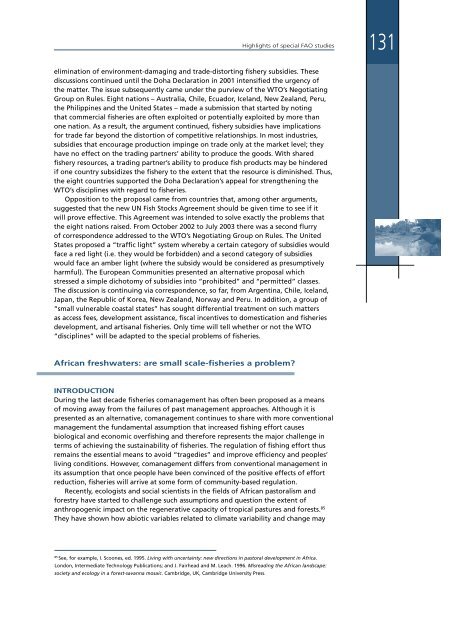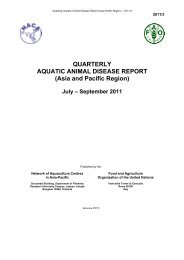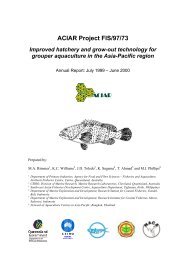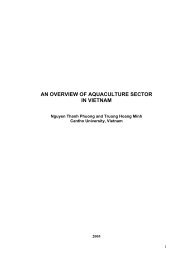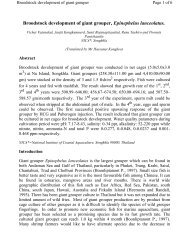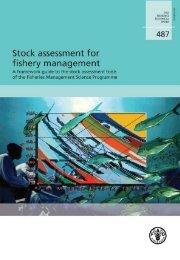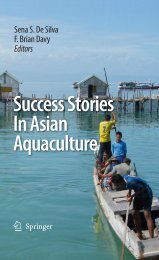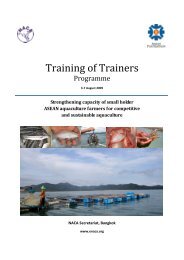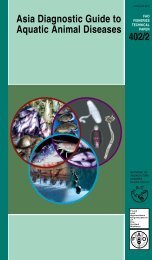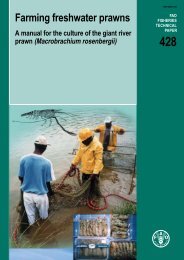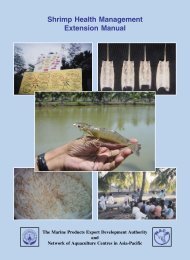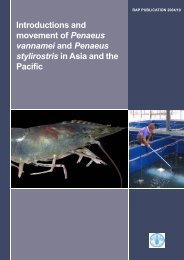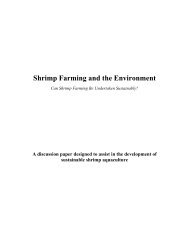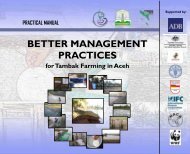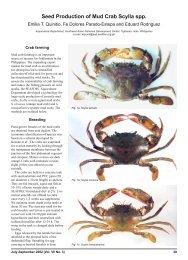State of World Fisheries and Aquaculture 2004 - Library
State of World Fisheries and Aquaculture 2004 - Library
State of World Fisheries and Aquaculture 2004 - Library
Create successful ePaper yourself
Turn your PDF publications into a flip-book with our unique Google optimized e-Paper software.
Highlights <strong>of</strong> special FAO studies<br />
131<br />
elimination <strong>of</strong> environment-damaging <strong>and</strong> trade-distorting fishery subsidies. These<br />
discussions continued until the Doha Declaration in 2001 intensified the urgency <strong>of</strong><br />
the matter. The issue subsequently came under the purview <strong>of</strong> the WTO’s Negotiating<br />
Group on Rules. Eight nations – Australia, Chile, Ecuador, Icel<strong>and</strong>, New Zeal<strong>and</strong>, Peru,<br />
the Philippines <strong>and</strong> the United <strong>State</strong>s – made a submission that started by noting<br />
that commercial fisheries are <strong>of</strong>ten exploited or potentially exploited by more than<br />
one nation. As a result, the argument continued, fishery subsidies have implications<br />
for trade far beyond the distortion <strong>of</strong> competitive relationships. In most industries,<br />
subsidies that encourage production impinge on trade only at the market level; they<br />
have no effect on the trading partners’ ability to produce the goods. With shared<br />
fishery resources, a trading partner’s ability to produce fish products may be hindered<br />
if one country subsidizes the fishery to the extent that the resource is diminished. Thus,<br />
the eight countries supported the Doha Declaration’s appeal for strengthening the<br />
WTO’s disciplines with regard to fisheries.<br />
Opposition to the proposal came from countries that, among other arguments,<br />
suggested that the new UN Fish Stocks Agreement should be given time to see if it<br />
will prove effective. This Agreement was intended to solve exactly the problems that<br />
the eight nations raised. From October 2002 to July 2003 there was a second flurry<br />
<strong>of</strong> correspondence addressed to the WTO’s Negotiating Group on Rules. The United<br />
<strong>State</strong>s proposed a “traffic light” system whereby a certain category <strong>of</strong> subsidies would<br />
face a red light (i.e. they would be forbidden) <strong>and</strong> a second category <strong>of</strong> subsidies<br />
would face an amber light (where the subsidy would be considered as presumptively<br />
harmful). The European Communities presented an alternative proposal which<br />
stressed a simple dichotomy <strong>of</strong> subsidies into “prohibited” <strong>and</strong> “permitted” classes.<br />
The discussion is continuing via correspondence, so far, from Argentina, Chile, Icel<strong>and</strong>,<br />
Japan, the Republic <strong>of</strong> Korea, New Zeal<strong>and</strong>, Norway <strong>and</strong> Peru. In addition, a group <strong>of</strong><br />
“small vulnerable coastal states” has sought differential treatment on such matters<br />
as access fees, development assistance, fiscal incentives to domestication <strong>and</strong> fisheries<br />
development, <strong>and</strong> artisanal fisheries. Only time will tell whether or not the WTO<br />
“disciplines” will be adapted to the special problems <strong>of</strong> fisheries.<br />
African freshwaters: are small scale-fisheries a problem?<br />
INTRODUCTION<br />
During the last decade fisheries comanagement has <strong>of</strong>ten been proposed as a means<br />
<strong>of</strong> moving away from the failures <strong>of</strong> past management approaches. Although it is<br />
presented as an alternative, comanagement continues to share with more conventional<br />
management the fundamental assumption that increased fishing effort causes<br />
biological <strong>and</strong> economic overfishing <strong>and</strong> therefore represents the major challenge in<br />
terms <strong>of</strong> achieving the sustainability <strong>of</strong> fisheries. The regulation <strong>of</strong> fishing effort thus<br />
remains the essential means to avoid “tragedies” <strong>and</strong> improve efficiency <strong>and</strong> peoples’<br />
living conditions. However, comanagement differs from conventional management in<br />
its assumption that once people have been convinced <strong>of</strong> the positive effects <strong>of</strong> effort<br />
reduction, fisheries will arrive at some form <strong>of</strong> community-based regulation.<br />
Recently, ecologists <strong>and</strong> social scientists in the fields <strong>of</strong> African pastoralism <strong>and</strong><br />
forestry have started to challenge such assumptions <strong>and</strong> question the extent <strong>of</strong><br />
anthropogenic impact on the regenerative capacity <strong>of</strong> tropical pastures <strong>and</strong> forests. 85<br />
They have shown how abiotic variables related to climate variability <strong>and</strong> change may<br />
85<br />
See, for example, I. Scoones, ed. 1995. Living with uncertainty: new directions in pastoral development in Africa.<br />
London, Intermediate Technology Publications; <strong>and</strong> J. Fairhead <strong>and</strong> M. Leach. 1996. Misreading the African l<strong>and</strong>scape:<br />
society <strong>and</strong> ecology in a forest-savanna mosaic. Cambridge, UK, Cambridge University Press.


